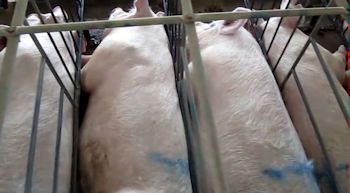SEJournal Online is the digital news magazine of the Society of Environmental Journalists. Learn more about SEJournal Online, including submission, subscription and advertising information.
One way to deal with bad press is to make it illegal. Exposés of inhumane conditions at feedlots and slaughterhouses are being made illegal by state legislatures that pass "ag gag" laws. Now a case in Utah is challenging whether industrial agriculture's claims of secrecy trump the eating public's right to know.
Four animal-rights activists were arrested September 24, 2014, after they were accused of driving onto the property of Circle Four Farms in Milford, Utah. The activists said they were driving on, and taking pictures from, a public road.
 |
| Sows in 7'x2' Smithfield Foods gestation crates, 2010. By Humane Society of the United States [CC BY 3.0], via Wikimedia Commons. |
Circle Four is not just any hog farm. It is part of the largest hog-feeding operation in the country and it is owned by the Chinese. Circle Four is owned by Murphy-Brown, a subsidiary of Smithfield Foods, one of the world's largest pork producers. Circle Four is Smithfield's largest hog operation, producing some 1.2 million hogs per year. Smithfield in 2013 underwent a $5-billion acquisition by the Hong-Kong based Shuanghui International.
The four activists arrested last year pled not guilty January 7 and 8, 2015, to two charges — one of trespassing and one of "interference" with an agricultural operation, which comes under Utah's ag-gag law.
The Utah law is being challenged by animal-rights activists and a coalition of 17 journalism groups, who say it interferes with the First Amendment Right of freedom of the press. Those groups are led by the Reporters Committee for Freedom of the Press. The groups argue that public knowledge of food production conditions is more than just a free press issue, but a matter of food safety. The J-groups challenge of the Utah law is still pending.
Meanwhile, the Reporters Committee is raising the same First Amendment issues in a similar case in Idaho, which also has an ag-gag law. At least eight states have such laws, Utah, Idaho, Colorado, Iowa, Missouri, Kansas, Montana, and North Dakota. States are being encouraged to pass legislation drafted by the American Legislative Exchange Council (ALEC).
ALEC's push continues. A similar ag-gag bill was introduced this week at the beginning of the 2015 legislative session in Washington state. The Washington legislature will consider it without waiting to see whether federal district judges in Utah and Idaho find ag-gag laws unconstitutional.
- "4 Charged Under Utah's Controversial 'Ag-Gag' Law," Associated Press, January 8, 2015, by Lindsay Whitehurst.
- "'Ag-Gag' Bill Introduced in the Washington State Legislature," Food Safety News, January 13, 2015, by Dan Flynn.
- "Utah 'Ag-Gag' Law Interferes with First Amendment Rights, Reporters Committee Argues," Release of December 11, 2013, Reporters Committee for Freedom of the Press.
- "Animal Legal Defense Fund v. Wasden," Briefs and Comments, Reporters Committee for Freedom of the Press, December 4, 2014.
- "Utah Hog Farm Part of $7.1 Billion Chinese Deal," Salt Lake Tribune, July 12, 2013, by Dawn House.
- "Circle Four Farms Confronts Odor Problems," National Hog Farmer, June 1, 1998, by Karen McMahon.
- "Circle Four Farms Series: Odor Issue Is a Stinker for Pig Farm Neighbors," Deseret News, July 30, 2001, by Gregory P. Kratz.
- "Stench of Mammoth Hog Operation Divides Farming Community," Associated Press, November 30, 1997, by Mike Carter.
- Previous Stories: WatchDogs of April 2, 2014, December 18, 2013, May 22, 2013, and March 7, 2012.









 Advertisement
Advertisement 


